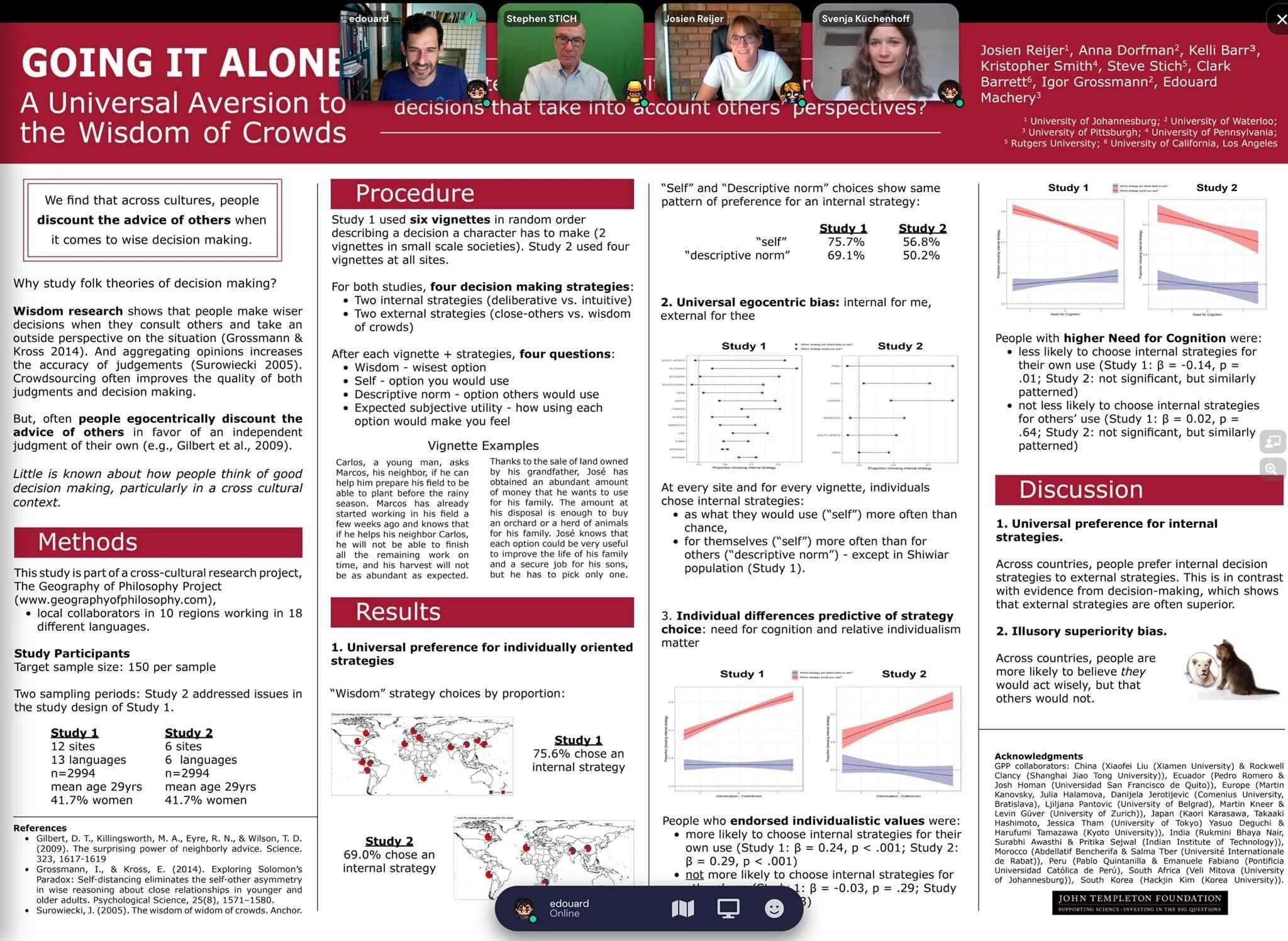Are concepts of knowledge, wisdom, and understanding universal across demographics? Learn about the global effort to explore diversity outside of the Western tradition of philosophy.
Join the GPP Conference
The Geography of Philosophy Project (GPP) is celebrating the conclusion of its investigation into the themes of Knowledge, Wisdom, and Understanding with a final conference on October 13-15, 2022. Register to join online.
Final Conference Announced for October 2022
The Final Conference celebrating the conclusion of the Geography of Philosophy Project is set for October 2022 at the University of Pittsburgh. Learn more at Final Conference 2022.
A New Approach to Philosophy
Ny Vasil on Covid-19 and misinformation
Ny Vasil presents at CogSci 2021 on COVID-19 and misinformation: https://www.youtube.com/watch?v=coADiwwb7TA
Postdocs present in 2021 conferences
Meet the GPP: a new video series on YouTube
Meet the PIs, team leaders, and postdoctoral fellows making the project happen in a new interview series for the GPP. Subscribe to our YouTube channel for updates.
Resources for aiding communities of Amazonia during the covid-19 emergency
Community Organizations
COICA | Coordinator of Indigenous Organizations of the Amazon River Basin
CONAIE | Confederation of Indigenous Nationalities of the Ecuadorian Amazon
Coshikox | Council of Shipibo Konibo Xetebo
Information
New York Times | “The Amazon, Giver of Life, Unleashes the Pandemic”
Fundraising Efforts
Please read the literature provided by these organizations before donating.
Amazon Frontlines | Ecuador's Amazon Emergency Action Fund https://give.amazonfrontlines.org/campaign/amazon-action-fund-covid-19/c279501
Doctors Without Borders
The Fund for Global Human Rights
Shipibo-Conibo Center Inc. | Heal the Healers GoFundMe
__________
The Geography of Philosophy Project is not affiliated with the listed organizations. Our team of researchers aim to raise awareness of the current emergency in South America by providing our online community access to information and fundraising initiatives.
Geography of Philosophy Project extended through December 2022
The Geography of Philosophy Project, an in depth, cross-cultural exploration of the concepts of knowledge, understanding and wisdom, has been extended. The Project, which receives major funding from the John Templeton Foundation, is conducting studies on five continents, using a wide range of methods. Though originally scheduled to end in May 2021, the John Templeton Foundation has extended the Project through December 2022. The Foundation has also provided generous additional funding (by $546,777 from $2,569,563 to $3,116,340) that will enable Project teams around the world to transition to online data collection and continue the Project’s cutting edge, in depth studies, despite the disruptions caused by the global Covid-19 pandemic. The Project PIs—Clark Barrett, Edouard Machery, and Steve Stich—and the international Team Leaders are enormously grateful to the John Templeton Foundation President, Heather Templeton Dill, and to the Foundation’s dedicated staff for their ongoing support of research inspired by Sir John Templeton’s conviction that all intellectual traditions would be enriched by deep exploration of fundamental philosophical concepts in cultures around the world.
Clark Barrett (UCLA, Anthropology), Edouard Machery (Pittsburgh, HPS), and Steve Stich (Rutgers, Philosophy), PIs of the Geography of Philosophy Project.
Call For Papers - Review of Philosophy and Psychology
Special Issue of the Review of Philosophy and Psychology on Cultural Variation in Cognition
Editors: Edouard Machery, Stephen Stich, and Joshua Knobe
Deadline: April 1, 2021
This special issue will bring together scientists and philosophers with radically different views about two outstanding and still controversial questions:
To what extent and in what way is cognition influenced by culture?
Is cross-cultural research essential to cognitive science?
Ten years ago, in their groundbreaking article in Behavioral and Brain Sciences, “The weirdest people in the world,” Heine, Henrich, and Norenzayan challenged the behavioral sciences to take into account the radical influence of culture on cognition and behavior, but despite the undeniable success of this article and growing interest in cross-cultural research, studying cultural variation remains an after thought in much of the social sciences.
We are inviting articles addressing the question of the influence of culture on cognition and the place of cross-cultural research in the behavioral sciences.
The following questions are of particular interest for this special issue:
What is the extent of cultural variation in cognition? Is the human mind fundamentally uniform across cultures (the “psychic unity” of humanity)?
Why does cognition vary across cultures (if it does)?
Should psychology be a historical science like historical linguistics?
Is the WEIRD vs. non-WEIRD distinction useful for psychology and other behavioral sciences? How to go beyond it?
Is the concept of culture useful to study cognitive variation? How to identify the cultural units that are relevant for psychology?
How to analyze cross-cultural data?
What are the challenges for cross-cultural research?
How can team science contribute to cross-cultural research? What are its challenges and limitations?
How to do cross-cultural research in an ethical manner? How should local populations be involved? Can local populations contribute to the formulation of scientific questions themselves?
How should a Constraint on Generality statement be required for publication?
What implications do debates about cultural variation in cognition have for traditional philosophical issues and for philosophical methodology?
Deadline: April 1, 2021.
The special issue will include articles by the following authors:
Joseph Henrich, Harvard, Human Evolutionary Biology (heb.fas.harvard.edu/people/joseph-henrich)
Richard Nisbett, Michigan, Psychology (sites.lsa.umich.edu/nisbett/)
Christine Legare, University of Texas at Austin, Psychology (www.cristinelegare.com/)
It will also include the exchange between Machery and Stich on one side and Joshua Knobe on the other.
Papers are to be submitted to the Review of Philosophy and Psychology under the SI: Cultural Variation in Cognition. Please contact Edouard Machery (machery@pitt.edu) if you have any questions.
View on the blog







